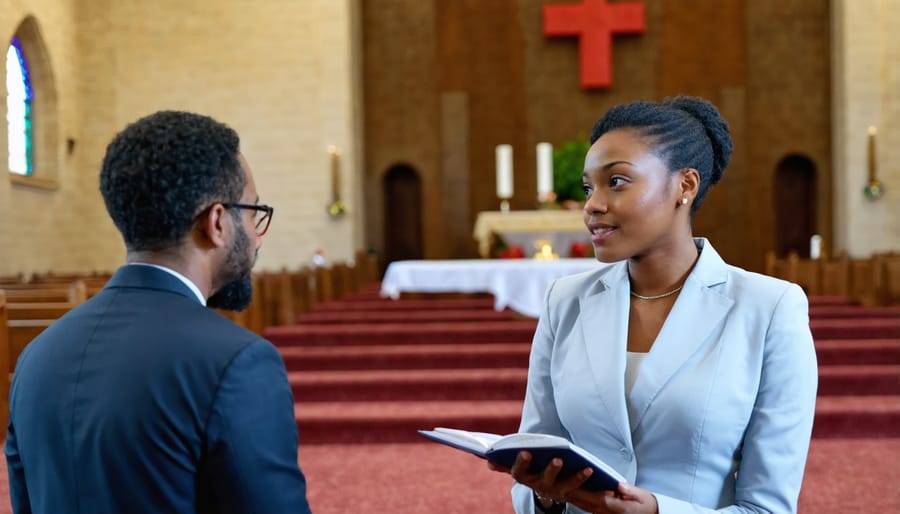Faith-based communities serve as powerful catalysts for healing, growth, and transformation in our modern world. These sacred spaces, bound together by shared beliefs and biblical principles for conflict resolution, create environments where individuals can discover purpose, forge meaningful relationships, and experience God’s love in tangible ways.
At their core, faith-based communities embody the ancient wisdom of gathering together in worship while addressing contemporary challenges through the lens of spiritual guidance. Whether manifested in local churches, prayer groups, or charitable organizations, these communities demonstrate how collective faith can transform individual lives and entire neighborhoods. They offer refuge for the weary, hope for the discouraged, and practical support for those navigating life’s complexities.
Research consistently shows that active participation in faith-based communities correlates with improved mental health, stronger social connections, and enhanced resilience during difficult times. These communities uniquely position themselves at the intersection of spiritual nurture and social action, offering both eternal perspective and immediate, practical assistance to those in need.
As we explore the vital role of faith-based communities in modern society, we’ll examine how these sacred spaces foster healing, promote unity, and serve as beacons of hope in an increasingly fragmented world. Through understanding their essential characteristics and impact, we can better appreciate how faith-based communities continue to shape both individual lives and collective social good.
The Biblical Foundation for Community-Based Conflict Resolution
Key Scripture Teachings on Unity and Reconciliation
Scripture provides rich guidance on maintaining unity amidst differences and fostering reconciliation within faith communities. In Ephesians 4:3, believers are called to “make every effort to keep the unity of the Spirit through the bond of peace,” establishing unity as a fundamental Christian principle.
Jesus’s teachings in Matthew 18:15-17 outline a clear process for addressing conflicts within the community, emphasizing direct communication and progressive involvement of the wider church family when needed. This approach respects both individual dignity and community wellness.
The apostle Paul’s wisdom in Romans 12:18 encourages us to “live at peace with everyone” as far as it depends on us, while Colossians 3:13 reminds us to “forgive one another if any of you has a grievance against someone. Forgive as the Lord forgave you.”
These teachings are complemented by practical guidance in James 1:19, which advises believers to be “quick to listen, slow to speak and slow to become angry.” This creates a foundation for healthy dialogue and understanding within the community.
Additionally, Philippians 2:3-4 emphasizes the importance of humility and considering others’ interests above our own, a crucial mindset for maintaining harmony in faith-based communities. These scriptural principles, when applied with love and wisdom, help create resilient, united communities of faith.
The Matthew 18 Model
The Matthew 18 model represents Jesus’s divine wisdom for handling conflicts within faith communities. In verses 15-17, Jesus outlines a clear, step-by-step approach that combines grace with accountability. This model begins with private conversation, emphasizing the importance of addressing issues directly and respectfully with the person involved.
“If your brother or sister sins, go and point out their fault, just between the two of you,” Jesus instructs. This first step protects dignity and creates space for honest dialogue without public embarrassment. If the initial conversation doesn’t lead to resolution, Jesus advises bringing one or two others into the discussion, fulfilling the biblical principle that “every matter may be established by the testimony of two or three witnesses.”
Only after these private attempts at reconciliation should the matter be brought before the church community. This progression demonstrates both patience and persistence in pursuing peace while maintaining the community’s spiritual health. The model’s beauty lies in its balance between showing love and maintaining accountability.
What makes this approach particularly effective is its focus on restoration rather than punishment. The goal isn’t to shame or exclude but to guide fellow believers back into right relationship with God and others. When implemented with genuine care and humility, this model helps preserve unity while addressing challenges that could otherwise divide the community.
Essential Elements of Faith-Based Community Conflict Resolution

Prayer and Spiritual Discernment
Prayer and spiritual discernment serve as foundational elements in resolving conflicts within faith-based communities. As Scripture reminds us in James 1:5, “If any of you lacks wisdom, you should ask God, who gives generously to all without finding fault, and it will be given to you.” This divine guidance through prayer becomes particularly crucial when communities face challenging situations or disagreements.
When conflicts arise, community members are encouraged to seek God’s wisdom through both individual and corporate prayer. This practice helps create a peaceful atmosphere where the Holy Spirit can work in hearts and minds. Prayer allows individuals to step back from emotional reactions and seek God’s perspective on the situation.
Spiritual discernment involves carefully listening for God’s guidance while examining situations through the lens of Scripture. This process often includes:
– Spending time in silent prayer and meditation
– Studying relevant Bible passages
– Seeking counsel from spiritual leaders
– Reflecting on God’s previous faithfulness in similar situations
Communities that prioritize prayer and discernment often experience more peaceful resolution processes. As Philippians 4:6-7 teaches, “Do not be anxious about anything, but in every situation, by prayer and petition, with thanksgiving, present your requests to God. And the peace of God, which transcends all understanding, will guard your hearts and your minds in Christ Jesus.”
Through these spiritual practices, faith-based communities can transform conflicts into opportunities for growth, healing, and deeper unity in Christ.
Communal Support and Accountability
In faith-based communities, the power of collective support and accountability plays a vital role in resolving conflicts effectively. As Scripture reminds us in Ecclesiastes 4:9-10, “Two are better than one… If either of them falls down, one can help the other up.” This biblical principle underscores the importance of community involvement in healing and reconciliation.
When conflicts arise, the community serves as a source of wisdom, prayer support, and gentle guidance. Members can offer different perspectives, share experiences, and provide emotional support to those involved in disagreements. This collaborative approach helps prevent isolation and encourages growth through challenges, as mentioned in Proverbs 27:17, “As iron sharpens iron, so one person sharpens another.”
Community accountability ensures that conflict resolution follows biblical principles and maintains focus on restoration rather than punishment. Through regular fellowship, small group discussions, and mentoring relationships, members help each other stay committed to the reconciliation process. They can lovingly point out blind spots, encourage forgiveness, and celebrate progress together.
The community also provides practical support during difficult times, whether through prayer circles, mediation assistance, or simply being present to listen. This creates an environment where people feel safe to address conflicts openly and work towards resolution with confidence, knowing they have the backing of their spiritual family.
Most importantly, communal support reminds us that we’re not alone in our struggles, reflecting God’s design for His church as a unified body working together for His glory.

Grace-Filled Communication
Communication within faith-based communities should reflect the love and grace exemplified by Christ. As followers of Jesus, we are called to speak truth in love (Ephesians 4:15) while maintaining the unity of the Spirit through the bond of peace. Engaging in grace-filled dialogue requires intentional practice of Christ-like attributes: patience, humility, and understanding.
The foundation of grace-filled communication lies in active listening and empathy. Jesus consistently demonstrated these qualities in His interactions, whether speaking with religious leaders or connecting with those society had marginalized. By following His example, we create spaces where authentic dialogue can flourish and deep understanding can grow.
Several key principles guide Christ-centered communication:
– Speaking with gentleness and respect (1 Peter 3:15)
– Seeking to understand before being understood
– Acknowledging our own biases and limitations
– Extending grace as freely as we have received it
– Practicing forgiveness and reconciliation
When we approach conversations with these principles in mind, we create an environment where truth can be spoken in love and relationships can be strengthened. This approach helps build bridges across differences and fosters genuine community, allowing God’s love to shine through our interactions and draw others to Him.
Remember that effective communication in faith-based communities isn’t about winning arguments but about building relationships that reflect Christ’s character and advance His kingdom.
Practical Steps for Faith Communities in Conflict Resolution
Creating Safe Spaces for Dialogue
Creating safe spaces for dialogue within faith-based communities requires intentional effort and Christ-centered principles. Just as Jesus created an atmosphere of trust and openness with His disciples, we too must cultivate environments where honest conversations can flourish. These spaces become sacred ground for healing broken relationships and fostering understanding among believers.
Start by establishing clear guidelines that reflect biblical values. Emphasize confidentiality, respect, and active listening as foundational principles. Remember Paul’s words in Ephesians 4:29, “Let no corrupting talk come out of your mouths, but only such as is good for building up.” This scripture should guide all interactions within these safe spaces.
Physical setting matters too. Choose neutral, comfortable locations where people feel at ease sharing their hearts. Consider arranging seating in circles rather than rows to promote equality and connection. Ensure privacy and minimize distractions that might hinder open dialogue.
Incorporate prayer at the beginning and end of difficult conversations. This practice reminds participants of God’s presence and their shared commitment to unity in Christ. As James 1:19 teaches, encourage everyone to be “quick to listen, slow to speak, and slow to become angry.”
Establish ground rules that prohibit interrupting, judgment, or hostile body language. Train facilitators who can guide discussions with wisdom and gentleness, following the Holy Spirit’s leading. When tensions rise, these leaders should be prepared to pause conversations for prayer or reflection.
Remember that creating safe spaces is an ongoing process that requires patience, commitment, and grace. As trust builds over time, these environments become powerful tools for strengthening community bonds and fostering genuine reconciliation.

Building Resolution Teams
Building effective resolution teams within faith-based communities requires prayerful consideration and intentional preparation. As Scripture reminds us in Ecclesiastes 4:9-10, “Two are better than one… If either of them falls down, one can help the other up.” This biblical principle guides us in creating teams that can minister to our community during times of conflict.
Start by identifying individuals who demonstrate spiritual maturity, wisdom, and empathy. Look for people who exhibit the fruits of the Spirit, particularly patience, gentleness, and peace. These team members should represent diverse perspectives and experiences within your congregation while maintaining unity in Christ.
Provide comprehensive training that combines biblical conflict resolution principles with practical mediation skills. Team members should study relevant Scripture passages about reconciliation and peace-making, while also learning active listening techniques and effective communication strategies.
Essential components of team training should include:
– Understanding biblical models of reconciliation
– Developing active listening skills
– Learning to identify root causes of conflict
– Practicing impartiality and confidentiality
– Mastering gentle confrontation techniques
– Understanding when to involve church leadership
Regular prayer and devotional time should be integrated into team meetings, ensuring that spiritual growth remains central to the ministry. Create opportunities for team members to role-play scenarios and receive constructive feedback in a safe environment.
Establish clear protocols for when and how the resolution team should be engaged. Define boundaries, reporting structures, and accountability measures. Remember that the goal is not just to resolve conflicts but to promote healing and growth within the body of Christ, following Paul’s guidance to “make every effort to keep the unity of the Spirit through the bond of peace” (Ephesians 4:3).
In our journey through understanding faith-based conflict resolution, we’ve seen how the power of faith can transform even the most challenging situations into opportunities for growth and reconciliation. As Jesus taught us in Matthew 5:9, “Blessed are the peacemakers, for they shall be called children of God.” This divine calling to be peacemakers extends to every member of our faith communities.
The implementation of faith-based conflict resolution practices isn’t just about solving problems; it’s about building stronger, more resilient communities that reflect God’s love and grace. When we approach conflicts with prayer, compassion, and biblical wisdom, we create spaces where healing and understanding can flourish.
Consider starting small within your own circle of influence. Whether it’s mediating a disagreement in your Bible study group or helping to resolve tensions in your church committee, each effort contributes to a larger tapestry of peace. Remember that the Holy Spirit is our ultimate guide in these endeavors, providing wisdom and discernment when needed.
As we move forward, let us embrace these principles with courage and hope. The transformation we seek begins with individual hearts and ripples outward to touch entire communities. Through patient listening, humble dialogue, and steadfast faith, we can create lasting change that honors God and serves our neighbors.
Let us commit to being instruments of peace in our faith communities, knowing that our efforts, guided by Scripture and powered by divine love, can help build the kingdom of God here on earth. As we read in James 3:18, “And a harvest of righteousness is sown in peace by those who make peace.”
